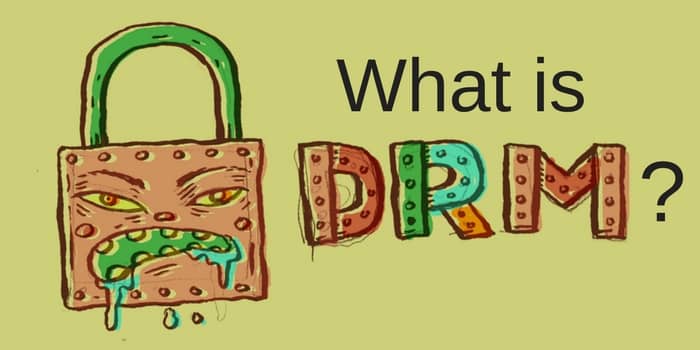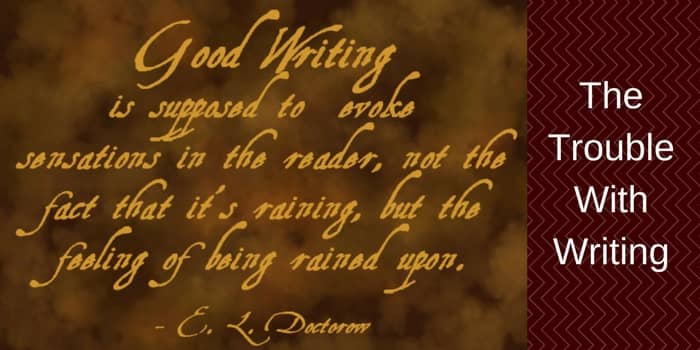
DRM benefits retailers and not authors
DRM is an acronym for ‘Digital Rights Management’, and is something that all readers and authors of ebooks should understand. Sometimes called ‘Digital Restrictions Management’ by those who know how it works, it is a method used by retailers of digital products, including ebooks, to restrict the use of the file.
Originally applied to music, many vendors of ebooks now use DRM to control what a buyer can do with an ebook. It also allows control over what a vendor can do with a file even after purchase. The well-publicised story of the Norwegian woman who had her Kindle ‘wiped’ by Amazon, is a rude example of what DRM means to a buyer of digital products protected by DRM.
Most often, DRM blocks the ability to share or copy a file and can also restrict the use to one particular device. In the case of those familiar with Apple digital products, files are often restricted to a certain number of devices. For those with Kindles, it is clear that you can only use the ebook on your device – and the possibility for Amazon to control the ebook file once on the device. Even the ability to delete it after purchase.
As an author, of course, I like to sell books and ebooks. However, I am a firm believer that a book is a book is a book, and that a buyer of my books has the right to read, keep, lend, save and store my ebooks after purchase. Exactly the same as can be done when someone buys one of my books in paperback form.
Digital Restrictions Management is technology that controls what you can do with the digital media and devices you own. When a program doesn’t let you share a song, read an ebook on another device, or play a game without an internet connection, you are being restricted by DRM. In other words, DRM creates a damaged good. It prevents you from doing what would normally be possible if it wasn’t there, and this is creating a dangerous situation for freedom, privacy and censorship.
Source: http://www.defectivebydesign.org/what_is_drm_digital_restrictions_management
To enable those readers who buy my ebooks to freely enjoy, share, lend and store their purchases, I have recently moved all of my books to Smashwords, who sell ebooks DRM Free, and have made it the first buying choice on my website. Yes, ‘One Click‘ purchasing is very convenient, but do you really want someone else to have control over what you buy, after you buy it? That in my mind is only renting, and on very restrictive conditions.
Free the ebook for readers by supporting and buying DRM FREE ebooks.




I’m not too familiar with it all, but I would think it’s more to protect the author. Maybe I’m wrong. But you have the choice on Amazon and can tick either box:
-Enable digital rights management
-Do not enable digital rights management
Just copied that from there.
My problem with Smashwords is, that my book don’t sell there. At all.
DRM doesn’t protect an author in any way at all Stella. It is not used to protect copyright or content, but to protect and restrict the use of an electronic file. Amazon do give a DRM choice when publishing, but it’s hardly relevant because Kindle publish their files in their own proprietary format, which can’t be used on any other device.
Even though I had a 10 month hiatus from Smashwords, since I’ve returned my sales are getting back to what they were before I took the KDP Select holiday. Around 50/50. Most of my sales generated by Smashwords are via Apple, B&N and Sony, but I have noticed more sales directly from Smashwords recently.
Never had any sales with SW. I have the books there, but it wouldn’t make any difference if I hadn’t. Shame, I wanted customers to be able to choose. We’ll see if it happens at some point.
I have had sales at SW. The important thing is the platform to get titles into a wide range of e-retailers (and consolidate payments)
.
I agree Rosalie. Having your ebooks available on a number of retailers can only be a good thing. If the ebooks are DRM free too, even better as they can be shared easily and read by more people.
DRM is for the big (and growing bigger through mergers) houses who sell poorly fomatted eBooks for twenty dollars. They’re terrified of readers simply borrowing a copy from friends rather than shelling out the equivalent of ten coffees.
If someone had loaned me a copy of ‘February the Fifth’ I would have gone on to buy a copy of ‘Hal’ not to mention some of the other titles.
For an indie who writes good stories at an attractive price, DRM represents lost sales, not protection.
True Andrew. I get really get annoyed when my wife, who loves her Kindle by the way, buys a Kindle ebook and tells me how good it was and that I should read it. The choices I have, 1. Borrow her Kindle, which she uses all the time so no hope there. 2. Buy the damn book again. No way!! Or 3. Find a pirated copy because I don’t think it’s right or fair that I can’t access my wife’s legally bought books. Yes DRM sucks, and contrary to popular belief, it does nothing to protect the author.
I hear you.
When my wife and I both used Kobo touches, they were on a single account, so I would already have a copy of the book that she wanted me to read. I ended up buying a Kindle touch so I could keep an eye on the quality of my amazon titles. Not wanting to mess around with two eReaders, I gave the Kobo to my seventy year old mother who was starting to have respiratory problems with the paper dust that most diehard paper readers refer to as the ‘smell’ of a ‘real’ book.
Now I’m back to square one, having to borrow my wife’s kobo (as long as I have something from the big A that she want’s to read…). Of course, that’s also a format thing, not just DRM though DRM woudl almost certainly prevent me from converting a loaned book file for use on my Kindle.
If Amazon ever presumes to have the authority to remove books from my reader I will be on the phone to the California Attorney general’s Office filing a complaint of mail fraud against them at the first opportunity. Amazon is and has been out of control for far too long. Time to reign them in and if it takes criminal complaints against them, so be it.
Amazon DO presume and reserve that right Rick, and have exercised it just recently. This is what is so evil about DRM. When you buy a Kindle ebook from Amazon, you not only DO NOT own it, you can only use it on one registered device. That’s hardly buying in my language. It’s renting, and on a very tenuous and temporary arrangement.
Is this something that Amazon came up with or was it pushed for by the publishing houses? It really sounds like the kind of thing they might have insisted on before letting Amazon carry their products. In most other respects (ie: royalty rates, real time data) the big A seems like a sensible operation.
I think most indies leave the DRM button unchecked during the publishing process. It’s just the big houses that think DRM will help prevent piracy of their ‘reasonably priced’ eBooks. I really think they believe that eBooks cost more than paperbacks to produce and so they use high pricing to either scare us back to paperbacks or, at the least, to ensure a profit. That means they think they need DRM to protect against piracy (who wants to pay a grossly inflated price for electrons if you can find it free somewhere?)
I have no evidence on this, but I suspect that the publishers send their lawyers to pester the Big A into making an example of anyone caught in a DRM discrepancy. Even someone who actually paid full price, but just in the wrong region.
If you ask me, that sounds like the thinking of a traditional publisher who still does’nt understand the digital world.
I certainly buy less titles from the traditionally published writers than I used to. It’s partly because of the silly pricing structure, but also because of DRM. Like you said, Derek, only being able to use a title on one device, and not actually owning my copy really gets under my skin.
By the way, I’m re-reading ‘Hornblower’ in paperback format and noticed, last night, that the front matter expressly forbids the loaning of the book. The trads have always had that mindset, it seems. This is just the first time they’ve had a chance to punish their customers over it.
Andrew, You own what you buy from Amazon regardless of what they say or what buyer agreement the would presume to impose on a buyer. It is illegal to sell something to someone and in the fine print say they are not actually buying it. That is known as fraud no matter how many attorneys Amazon has.
Well, the button does say buy instead of contitionally license. So I’d have to say that they either have to change the terms or the button.
I checked my books and unfortunately 2 are DRMed. Once chosen it cannot be changed without pulling the book and republishing it.
Amazon can say anything they like and put any gibberish in their terms of use or sales agreements they like. That doesn’t mean it’s legal or exempts them from criminal or legal actions.
If I buy something and the seller would delusionally believe they still have the rights to do with it as they please, all I can say is see you in court.
I have heard this stupid argument a hundred times, this is how dumb it is, do you walk into the cinema and demand a print copy of the film roll you ????? No, then that is what you pay for a restricted viewing exactly the same as a cinema, only you get to watch it at home, at your leisure and as many times as you like. When you buy an aircraft you cannot just lend it to a friend who doesn’t have the right equipment to operate it/plane license or kindle device. There are an estimated 1000 copies of every Pink CD for every bought copy, only she makes squillions in concerts and other ways, we as authors do not.
You cannot share a copy of windows, you cannot lend or share you gun with someone who doe not have the license slash kindle in other words the correct legal equipment.
I do agree it is not buying in the traditional sense, it should have a different terminology, but definitely no sharing or ability to copy should ever be allowed, you want the book, then buy the actual book, if there isn’t one, the world is not responsible for the lack of traditional publishing by the author, nor the rest of the authors who will suffer from eBook only buyers complaints.
What annoys me most is the great majority are sold for a couple of dollars, and people want the right to jeopardize millions in income for an author so they can give someone something that cost a few dollars. No one has the right to ask for the keys to someone else shop, nor readers the right to leave the door open on the storeroom of the authors income.
The bottom line is simple if you don’t like eBooks, don’t buy them. You get them less the massive postage costs and real book costs, the lack of postage is the convenience and saving, and the lesser cost of the eBook itself the price of not being able to on-sell or lend the book.
If you could lend and sell it why would it be cheaper than paper?? no one in the world went to billabong or any other clothing company and said hey, now that you get them made in china for $2 why should we pay $50 for a tshirt? it cost you less money. We already sell for less because it cost less, but it doesn’t cost nothing, editors and illustrators still costs thousand and thousand of dollars. of course you can buy the Photoshop cover books with a word doc called ebook for .99cents. It will probably be DRM free, after all most of them want to be famous, the rest of us want to make a living.
It’s not a stupid argument. Your analogies are stupid. Does Microsoft go into your computer and erase the program after you bought? No. Does the movie theater erase your memory of a movie once you’ve seen it? No. Does the gun seller come into your home and remove the gun after a time with no explanation? No. Does the manufacturer of the aircraft suddenly remove your plane from it’s hanger for no reason? No. So nothing you’ve said is applicable to this situation. All bad metaphors.
Bottom line is that if you buy a product it is yours. The seller has no claim on or rights to do anything with it after you have paid for it. It may be protected by copyright laws that prevent you from making copies and distributing them for profit.
That is an excellent point or points I should say. I am totally new to all this, amazed, befuddled, etc. Published my book just a few weeks ago, sold a couple in the ebooks version but could not answer questions to readers, Thanks a lot.
That’s why you get a free DRM removal tool and run it on any files that you purchase/download that have a DRM on it. It’s not just Amazon that uses it, although they may have been the first. Many books I download have Adobe DRMs on them (both in epub and pdf format). I just run all my files through the DRM removal tool every few weeks and *voila*, I don’t have to worry about it.
I’m not using it maliciously, I’m not doing it so that I can go out and upload these to pirate sites, I’m doing it so I have *access* to the books I’ve downloaded. I don’t have a Kindle, I have a Kobo – which will read Kindle books but not with the DRM on it, which is annoying – and, in Amazon’s mind, the sure-fire way to sell a Kindle. But since Kindle sucks in Canada, I will rely on my Kobo.
Thank you. I believe the sharing of ideas is an important part of the artistic mission. Look at Paulo Coehlo, who has become a best seller while SHARING his work over the internet….If people love your work, they will buy it. I believe that. This is an interesting and important topic!
When I started to read this piece, I immediately thought of Smashwords and how they don’t restrict their downloads to one device and how you can download the purchase as many times as you like. Moreover, they give the author a much bigger slice of the proceeds than Kindle does, and changing the price is easier. They also have the coupon feature. I just finished having an anniversary promotion on my first publication and I used a coupon gimmick to give away 10 free copies. I didn’t get many sales. but I got two new reviews and the book, Monster Is in the Eye of the Beholder, now has an average 5-star rating.
I think I may begin promoting my books chiefly on Smashwords, and maybe with the next one that I publish, I’ll try not putting it on Kindle at all, at least for a while, and see what happens.
I agree Lorinda. Smashwords offer a lot of advantages for both the reader and the author. What I particularly like about Smashwords is their very open reporting of page stats, sales notification by email and that they answer any questions quickly, politely and informatively.
I think too, as readers learn of the advantages of buying from Smashwords they will appreciate that they truly do buy the ebook and not just rent one copy.